Robert Snyder
Proteios LLC, USA
Title: Integrated workflow for rapid and low-cost affinity purification of recombinant proteins
Biography
Biography: Robert Snyder
Abstract
Problem: The use of recombinant proteins has increased greatly in recent years, with the advantages of employing a tag fused to the recombinant protein of interest to facilitate its purification, now widely recognized. The His-tag is the most frequently used affinity tag for protein enrichment. His-tagged proteins can be readily purified by using immobilized transition metal ions such as Ni2+ or Co2+ as affinity ligands. However, the technology is not without disadvantages: His-tags can interfere with the biological function of proteins to which they are fused; the high imidazole concentrations used for elution can inactivate certain proteins by stripping them of metal ions; and purification resins contain toxic transition metal ions raising the real possibility of heavy metal leaching from the column during purification. However, the main drawback of His-tagging is its cost, which has been estimated to be as high as $2/mg of purified protein.
Orientation: In collaboration with the University of Washington, Proteios is developing a suite of protein purification kits based on the Car9™-tagging technology developed in Prof. Baneyx's laboratory. Car9 is a hydrophilic dodecapetide that enables recombinant proteins to bind with high affinity to silica, when fused to their N- or C-termini. The interaction can be disrupted with lysine, forming the basis of an affinity purification system that provides simple, one-step operation with rapid (less than 15 minutes) purification of recombinant proteins at lab- and small-scale quantities.
Findings: The Proteios kits will be five-to-ten times cheaper than current market options. The disposable, silica-based resin ProteoResin™ has been optimized for Car9 absorption and will not require lengthy and expensive cleaning/regeneration steps like Ni-NTA resins. The Car9 workflow, which has been validated and optimized, is being extended to include the low-cost cleavage of the N- or C-terminal Car9 tag using site- specific proteases.

